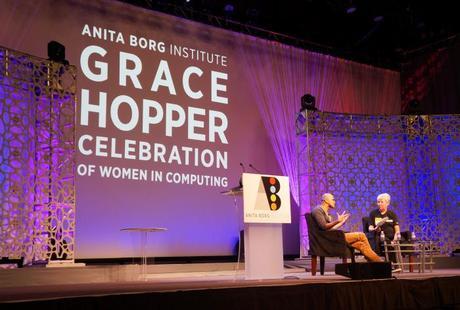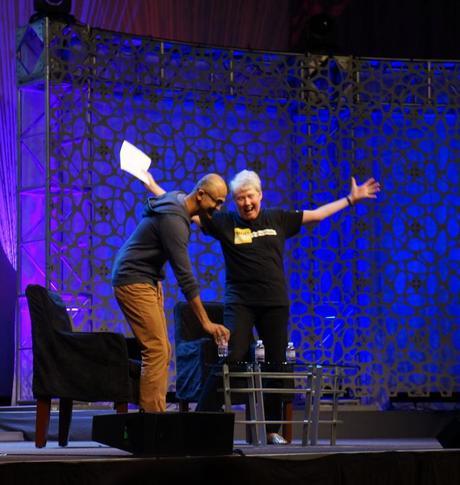I dream of a day when we no longer need events for women in computing. My experience at Grace Hopper was wonderfully positive but, unfortunately, the same cannot be said for some of the male attendees and speakers.

It’s an unfortunate and sad fact that, when gathered, a large number of minority representatives will automatically antagonize the other side. Simply tracking the #ghcmanwatch tag on Twitter throughout the conference showed that the Grace Hopper Celebration was most definitely a women celebration, not an equality celebration. And while the event was certainly a time and a place to celebrate all the amazing things that make women in computing powerful, being a proud woman and an advocate for women in tech is not a reason to be anti-men and to turn every thing our male allies say into a perceived attack on women.
The goal is equality. At least, it should be.
What are we really fighting for, as women? We’ve seen that in the past, when men were (and in some cases, still are) dominating the boardrooms and offices, and women were confined to the lesser roles. That clearly did not work, and we are slowly but surely working towards a world where that is no longer the norm. But then why does the feminist movement sometimes feel like it wants to be a movement towards total female domination? We know that having one sex in power does not work: it should not be about pushing the men out, but rather getting more women in and moving towards a more equal, neutral society.
The lower half of the male allies bingo card is taking an early lead… #ghcmanwatch #maleallies #bingo #ghc14 pic.twitter.com/dPg2rmGkqd
— Amelia Greenhall (@ameliagreenhall) October 9, 2014
The above tweet shows a BINGO card handed out prior to the male allies panel, which encouraged women to find the flaws in what the men were saying. Clearly, whoever made these cards was not going in to the allies session with an open mind, and wanted to encourage the women in the audience to look for the negatives instead of listen to the positives and see the positive intentions. Images like this were not uncommon on #ghcmanwatch and, speaking to some of the male attendees, I saw the effect that the antagonizing comments, posts and tweets had. One man said, “this is precisely why men don’t want to be part of the conversation,” speaking to the fact that his words were twisted when he tried to show support. This may make our male allies feel that, no matter what they say, it will be taken poorly or twisted out of context. At the male allies panel on Day 1 of GHC, the men on stage were visibly uncomfortable, and you could tell by the slow, careful way in which they spoke that they were making a conscious effort not to offend or say anything that could be taken out of context. Yet their words still were twisted, and their intentions even more so.
It feels like these men have (intentionally or not) hijacked something that was supposed to be ours, and made it about them. #ghcmanwatch
— Adrienne Hisbrook (@AHisbrook) October 13, 2014
If you want me to come tweet shit that men say at your tech conf, let me know. I also give talks ;) #ghcmanwatch #ghc14
— Cate Huston (@catehstn) October 11, 2014
The only time to put white male “allies” on the stage at a woman-centric event is in a dunk tank, to raise money for charity #ghcmanwatch
— Beth (@bethcodes) October 9, 2014
And now let’s address the big controversy that apparently has the whole world up in arms. Though Satya Nadella’s interview stirred up quite a bit of controversy on the net, I was impressed by his support and bravery in being the first major tech CEO to speak out in support of women in tech on such a broad scale. Yes, he said what he said, but the internet seems to have forgotten all the other great, positive things he said in his interview, including his feelings that he enjoys working with women, that “working hard is something that is worth doing,” and “each one of us has a few superpowers.” When Satya Nadella said you shouldn’t have to ask for a raise and told us to trust the system, he meant that, when the system is working correctly, the employer appreciates and the employee feels appreciated and you can move up the ladder without having the conflict of asking for a raise. I think he forgot that not every company works the same way Microsoft does, and was speaking as though the 8,000 attendees were his own employees. Because that’s the way it is at Microsoft: open, honest and fluid. People change roles often and move around the company based on what they and their managers feel is best suited to the unique situation, and the result is a very positive, natural approach to promotions and the raises that accompany them.

But of course, unfortunately for Satya, he wasn’t speaking to a room of Microsoft employees, he was talking to thousands of people, both in person and online, many of whom were waiting for him to slip up, simply because he’s a man. After the event he apologized publicly and in an internal email to employees, saying that he answered the question wrong and really did not mean that women shouldn’t take charge of their careers. Good, right? The situation should end there, maybe fizzle into the history books and be remembered as a small blip. But no, there are still petitions out their rallying for his resignation, tweets saying he hates women, and articles being written that paint him in a privileged light, as though he didn’t work hard to get where he is today.
The antagonizing, mean and downright deflating comments shared during GHC built up a negative wall between women and men, and though some people, myself included, shared our thoughts about the backwards nature of these interactions, many men still said that they would not be coming back to the conference next year. So, in trying to be inclusive and promote women in computing, we must make a conscious effort not to reverse our progress through unwarranted controversy and attacks. In balancing the scales of gender in technology, we must strive for a positive, uplifting environment for all those involved.






